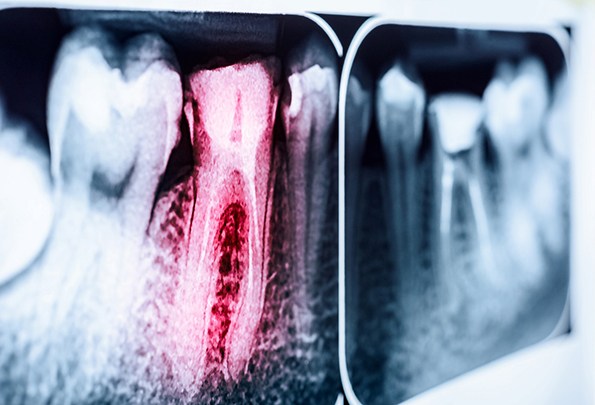Root Canal Therapy – Everett, WA
You Can Save Your Damaged Tooth

When people hear the phrase “root canal therapy,” they tend to think about discomfort or fear the treatment itself. The fact of the matter is the pain you’re experiencing now with your damaged or infected tooth disappears following a root canal. And, as a result of treatment, you don’t have your tooth extracted outright, which is always the more ideal outcome. To save your tooth from needing an extraction and to get out of pain, contact the dentist at Albright Family Dental today for root canal therapy in Everett, WA!
Why Choose Albright Family Dental for Root Canal Therapy?
- Soft Tissue Laser for Improved Precision & Comfort
- Painless Root Canal Therapy
- Nitrous Oxide & Oral Conscious Sedation Offered In-House
Do I Need Root Canal Therapy?

The most common sign that you need to have a root canal performed is chronic pain in your tooth. However, any diagnosis requires a comprehensive examination, so we’ll make sure to be extremely thorough during your visit. Other common symptoms include severe sensitivity to extreme temperatures, high fever, facial swelling, darkening or discoloring of your tooth, and pimple-like bumps on your gum tissue. If you have one or more of these symptoms, get to our dental office as soon as you can.
The Root Canal Process

The process for root canal therapy at Albright Family Dental is incredibly straightforward. Dr. Kaopua will first completely numb your mouth with a local anesthetic so that you remain pain-free throughout your visit. We may even provide you with sedation dentistry to help you relax and feel comfortable. Once we’ve confirmed that the numbing agent is working, we’ll then create a tiny hole in your tooth to allow us to remove any damaged and infected tissue from within the pulp.
After we’ve cleaned out the inner layers of your tooth, we’ll disinfect the area to ensure no harmful bacteria is left inside. The hollowed-out tooth will then be filled with a tooth-colored biocompatible material and we’ll sculpt the access hole with composite resin. In many cases, we’ll even provide a custom dental crown to protect and strengthen your repaired tooth.
The Benefits of Getting a Root Canal

While root canal therapy seems daunting or unsettling, the treatment is essential for alleviating pain and providing an effective way to preserve a healthy smile! By undergoing this procedure, you can be sure to enjoy plenty of benefits that can improve your overall quality of life, including:
- Secure and comfortable method for preventing the spread of infection
- Long-lasting solution to protect teeth from future complications and discomfort
- Renewed ability to eat, chew, and enjoy a pain-free smile
- Natural-looking crowns that will blend flawlessly and restore optimal function
- Avoid the cost and consequences of needing a tooth extraction
Understanding the Cost of Root Canals

While you may need a root canal, you’ll want to consider the treatment’s price before you commit. Your final care could exceed your budget if you don’t, resulting in many problems. That said, the cost of root canals varies by the patient; you should consult Dr. Kaopua for an exact estimate. Our dental team will also strive to make your treatment more affordable, walking you through its price factors, payment options, etc. Learn more by reading below, or call us soon.
Root Canal FAQs
Do Root Canals Hurt?
Hands down, “Do root canals hurt?” is one of the most-asked questions. If you’ve been wondering the same thing, then you’ll be happy to know that the process of eliminating the infection is virtually pain-free thanks to the numbing agents we use. Plus, the latest techniques and technologies ensure that you’ll be able to sit comfortably in the treatment chair while we work on your tooth. Simply put, getting a root canal does not hurt.
Important note: If you struggle with dental-related anxiety or feel nervous due to the sights, sounds, and smells of the dental office, ask about sedation dentistry! That way, you can feel completely calm and at-ease during your time in the treatment chair.
Can I Eat Before My Root Canal?
That depends. If you’re being sedated for your procedure, for example, then we may recommend fasting beforehand to help prevent nausea. If that’s not the case, then you may get the green light to eat something prior to arriving at our office. Just make sure that it’s something healthy and well-balanced.
Do I Need a Root Canal If My Toothache Went Away?
Patients are often surprised to hear that they still need a root canal, even after their toothache subsides. The reason why will become much more clear once you learn why your pain went away: the infection has “killed” the nerve of your tooth. Although you might not feel any soreness, sensitivity, or discomfort anymore, the root of the problem hasn’t gone away. In fact, it’s more important than ever that you get the necessary restorative care because, without it, your surrounding teeth and gums can suffer as well. So, even if you aren’t in pain or your once-painful toothache subsided, don’t put off your appointment with our Everett emergency dentist.
Can Root Canals Be Prevented?
Fortunately, large cavities and serious infections can usually be prevented. So, if you want to protect your teeth and gums from harm (and reduce your risk of needing root canal treatment in the process), then commit to a solid oral hygiene regimen. That means brushing and flossing consistently as well as getting a dental checkup and teeth cleaning twice a year. You should also take other measures to prevent decay and infections, like not over-indulging in added sugar and steering clear of tobacco products.
Is There Anything I Should Do Before My Root Canal?
We mentioned above that, in some cases, you need to fast prior to your procedure. So, make sure that you check-in with us to see if that’s necessary or not. Outside of that, it’s a good idea to go to the store and get anything you need, like soft foods and OTC pain medication. If oral conscious sedation is a part of your treatment plan, then it’s important that you arrange for a trusted adult to drive you to and from your appointment as well.




